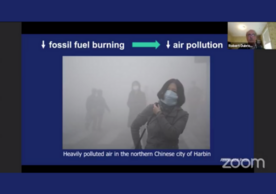
Professor of Epidemiology and Faculty Director of the Yale Center on Climate Change and Health Dr. Rob Dubrow, MD, PhD, described a bleak picture of the planet’s climate future at a virtual talk on October 27 as part of the YSN Planetary Health Speaker Series. Dr. Dubrow’s materials covered “Climate Change Mitigation: Protecting the Health of Current and Future Generations.”
Dr. Dubrow warned against maintaining a business-as-usual approach that maintains current greenhouse gas emissions. Under these conditions, parts of the world will eventually become uninhabitable. Sea level rise will spur abandonment of major coastal cities, outdoor labor productivity will be severely reduced due to the heat, and there will be severe global food insecurity.
“We should have started serious mitigation 30 years ago. We didn’t, but with this, it’s always better late than never,” Dr. Dubrow said.
Effects of warming include a higher frequency and intensity of extreme events such as heat waves, flooding, tropical cyclones and hurricanes, droughts, and wildfires. The severe weather leads to injuries and fatalities.
Dr. Dubrow detailed the immense impact of climate change on human health. Rising temperatures, rising sea levels, increasing carbon dioxide levels, and extreme weather events all strike powerful blows to the status quo.
For example, environmental degradation prompts forced migrations; poor water quality prompts outbreaks of cholera; and changes in vector ecology create environments hospitable to malaria, Lyme disease, and West Nile virus. Dr. Dubrow also emphasized that mental health suffering accompanies all of the above.
Essential Takeaways
Dr. Dubrow crystallized his findings into four main points:
- Climate change mitigation is absolutely essential to protect the health of current populations and the health of future generations.
- Adverse health impacts of climate change will intensify for at least several decades regardless of what actions are taken now.
- Climate change mitigation measures have major health benefits beyond the delayed outcomes of reducing greenhouse gas emissions.
- When building support for mitigation policies, it is useful to emphasize immediate health benefits.
The Power of Adaptation
Despite the grim foreshadowing, Dr. Dubrow also made recommendations for positive actions that can be taken now. In addition to planting trees, shifting to a more plant-focused diet, and voting, he highlighted several adaptations that can help.
- To combat coastal flooding, Dr. Dubrow recommends seawalls, zoning changes to prevent construction along coastlines, and planned retreat away from coastlines and rising sea levels.
- To fight food insecurity, reducing food waste and expanding urban agriculture can help.
- To address the risk of infectious disease, Dr. Dubrow endorses early warning systems and other surveillance.
- To reduce the harm of occupational heat stress for employees such as farm workers, water, rest, and shade are essential.
Dr. Dubrow was hopeful when describing mitigation practices. For example, decreasing the burning of fossil fuels also decreases carbon dioxide emissions and decreases toxic air pollutants. Therefore, converting from a fossil fuels economy to one that favors renewable energy will simultaneously help the climate and save millions of lives every year that would otherwise be lost to deadly air pollution.
Watch Dr. Dubrow’s full remarks on Facebook Live here.
